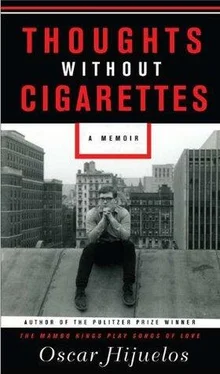He’d been a moderately wealthy and rather levelheaded businessman who in a moment of lapsed judgment placed both his trust and financial resources in the hands of one Gerardo Machado, a Liberal Party candidate for the presidency of Cuba, into whose coffers my grandfather’s money, by way of a large loan, had flowed. He must have been elated over Machado’s victory in 1925 and proud of the services he had rendered to his adopted country, until, having gotten into debt, he found it necessary to journey to Havana to address Machado about the urgently pressing matter of repayment, a notion to which Machado, in the tradition of a good man changed to the bad by power — as president he was to be known in Cuba as a “second Nero”—did not warm. Traveling frequently to Havana, my grandfather always came back to Holguín empty-handed, and his grief over that betrayal, as well as the financial ruin that accompanied it, accounted, in my mother’s opinion—“ Ay pero, hijo, fue algo muy triste ”—for the stroke that took his life one evening. He was taking a shower and singing the bolero “Dónde Estás Corazón,” when in mid-verse his voice, a fine baritone, simply stopped. My mother, opal eyed and lovely, had just turned fourteen.
Appropriately, his funeral was grand, a procession replete with a horse-drawn hearse, gloomy priests, men in dark tri-cornered hats beating drums solemnly, and hundreds of prayerful mourners winding from the street outside their house, where his body had lain in state overnight, to the church and then the campo santo . Lingering by his grave that day, my mother surely had her regrets, for, with the onset of adolescence, she had apparently become fond of tormenting him and, for that matter, quite a number of people with her untoward behaviors.
At school, despite winning prizes for writing essays and poetry and for singing the Cuban anthem, “La Bayamesa,” better than anyone else, she often got in trouble with her teachers for a generally insolent attitude. She had been the plague of a hapless local haberdasher whose female manikins, in the fine array of their 1920s flapper dresses, displayed in a row outside his arcade shop, my mother regularly knocked over at dusk just because she felt like it (this, in the dreams of her later life, she’d always remember as if it had just happened, with fondness and in detail, down to the mole just below the shopkeeper’s quivering, mustachioed lips.) She loved to repeat aloud to anyone who’d listen the randy verses she’d overhear on the streets; and when it rained, the sky bursting open, no matter the time of night, she couldn’t help but run outside and spin in circles in the torrential downpours, ruining her clothes and getting drenched to the bone. Why she did so she never knew. She’d consort with local brujas —or witches — whose homes she treated like second schools, made friends with the lowliest children from the streets, and expressed, fitfully, a longing to hang around the local dance halls. Unlike her sisters, she had gotten some cucarachas in her head, and her papá , a strict Spaniard at heart, responded as he only could. Her mother, María, never laid a hand on her, but her father did, over and over again—“ Me pegaba, mucho, mucho, ” she’d later tell me — often with a strap or a belt, and most violently so during periods of his greatest distress.
But no matter how much he beat her, it only provoked her further. Though she loved her papi more than any man in the world, she, sticking her tongue out at him, often spoke to her father in a manner that no daughter ever should. Even after he’d fallen on hard times, and there came the point when he no longer had the spirit or will to punish her, she still couldn’t help herself. My mother, a creature of habit, had become so accustomed to his beatings that when they stopped, her world turned upside down, and, seeing him brought so low, she’d practically beg her papi to beat her again, as if that would somehow bring back the better days of old.
Probably neighbors or some of her papá ’s former employees helped them to vacate their fine house for a more humble dwelling, but that move, by horse-drawn carts, or camión , with most of their furnishings having been sold off, must have been a disheartening and frightening experience for them, if not a pure misery. Far from Spain, with no other family in Cuba to call upon for reassurance, they surely must have felt so alone — and scattered; no wonder her nerves took a turn for the worse. I don’t know what skills Abuela María had, if any, or how she might have supported her young daughters, though I believe she may have become a seamstress. I do know that she was a woman of great piety, “ una santa ,” of a sweet and quiet disposition, and the sort who, never hurting a soul, didn’t know quite what to do with her spirited daughter. Spicing up any gathering with her vivacious manner, my mother seems to have become in her own way something of a minor celebrity in the dance halls of Holguín, where, she’d one day tell me, she became known as a “queen of the rumba.”
At carnival time, as throngs of partiers and musicians snaked through the streets, a battery of drummers beating out “La Chambelona” on their congas, she especially shined as a dancer, and among her nicknames, there was one, having to do with the movies, that apparently came about because of her high cheekbones and nearly luminescent eyes: the “Katie Hepburn” of Holguín. (While there are a few similarities between them, I have seen her in an early photograph, in which she, with a pageboy hairdo, slightly plumpish face, and a question-mark curl licking her ear, more easily resembled a silent film vamp like Theda Bara or Clara Bow, stars of her teenage years.) By the 1930s, as a pretty, light-skinned cubanita of a fierce intelligence and vivacious temperament, exuding an aristocratic air but also seeming accessible—“ Yo gozaba! ”—“I had my fun!”—she had no problem attracting the attentions of men, among them that boring but sturdy lawyer whom she’d turn away and of course, my father.
And my pop? Altogether, it’s hard to imagine that he, born in 1915 into a long-established farming family, experienced anything like loneliness while growing up in a house with so many siblings around: the two eldest, María Teresa (or Maya, as she was called when I knew her) and my father’s hermano major , Oscar, born in Jiguaní in 1903 and 1905 respectively, were followed in the next decade by Concepcion, Manuela, Isabel Regina, Graciela Antonia (or Chelo), Borja Angeles, and, in 1920, Olga del Carmen. (Caridad Luisa, the least fortunate of that family of otherwise long-lived females, who would have brought the number of Hijuelos-Gallego sisters to eight, was born in 1910 and died in 1912, probably of a fever.) Include my grandmother and grandfather, Regina Gallego and Leocadio Hijuelos; a retinue of household help (Negritos mainly, with shacks on a property consisting of hundreds of hectares of fruit, timber, and tobacco land); as well as countless relatives, both young and old, living nearby and often visiting their household (the Hijuelos-Gallego family tree, based in and around Jiguaní, included the surnames O’Connor, Diéguez, Peréz, Fonseca, García, Cabrera, and Lozano, among others) — he must have been constantly in the company of someone , with little privacy, if any. (However, remembering how he sometimes lived to be around people, I can’t imagine his ever having wanted to be left alone.)
Ten years his senior and known as a great horseman, my tio Oscar ran the farms alongside my abuelo Leocadio, most of his days spent on a chestnut mare, keeping after their workers. (I’ve been told there were three properties. They sold timber, with pine, ebony, mahogany, and oak woods growing there in abundance.) As the older brother, he would have taught my father to ride at an early age and surely have helped him through the rituals of manhood, taking him to cockfights, perhaps to a bordello, and who knows where else; for the longest time, they were inseparable, going everywhere together and making quite an impression on the people of Jiguaní, who’d remember the older brother for his steely (macho) air of authority and the other for his friendliness. It’s likely that, given the difference in their years, Oscar had loved his younger brother as deeply as he might a son. (Not so long ago, I met a black cubano in his late eighties, a retired New York City schoolteacher, who, remembering them from his teenage years in Jiguani, told me that they were always riding through town side by side on their horses, and that in their height — each was over six feet tall and broad shouldered — they made quite an impression as men to be reckoned with, but affably so: “They were good to one another, above all,” this schoolteacher had told me.)
Читать дальше












